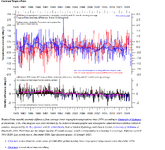GregLocock
Automotive
- Apr 10, 2001
- 23,576
Estimates of crop yields in USA out to 5 deg C of warming.
https://www.nature.com/articles/s41598-025-90254-2
https://www.nature.com/articles/s41598-025-90254-2
Follow along with the video below to see how to install our site as a web app on your home screen.
Note: This feature may not be available in some browsers.
The general hypothesis that warmer weather leads to better growing seasons for farmers is not very controversial. Now, that's assuming that you still have adequate water supplies, of course.Dik: Things may be getting worse in other areas. Winnipeg is likely to improve. We used to have a week or so of -35C to -40C weather in January and February. For the last 20 years it's hardly gotten below -30C.

Yup... but if you're not a plant, -30C is better than -40C.In general, it's drought and colder weather that hurts food production.
I suspect with climate change, the crop yields in Manitoba will slowly improve, caused by the change in temperatures. On the downside, things will likely change for the worse in other areas of the world.Correct me if I'm wrong. But, weren't we talking about crop yields and food supply?

...four times faster than the rest of the world.Oh the Arctic is getting warmer.

